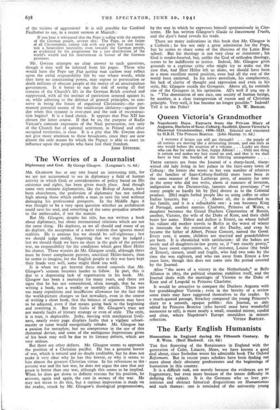Queen Victoria's Grandmother
In Napoleonic Days. Extracts from the Private Diary of Augusta, Duchess of Saxe-Coburg-Saalfeld, Queen Victoria's Maternal Grandmother, 1806-1821, Selected and translated by H.R.H. The Princess Beatrice. (John Murray. 7s. 6d.) I WONDER if letters can still get through? . . the people of all nations are moving like a devastating stream, and one feels as one would before the eruption of a volcano. . . . Lucky are those who can flee for safety to free, happy Albion!. . . Only one thing is certain and makes my hair stand on end, and that is we shall have to bear the burden of the billeting arrangements - . . .
THESE extracts are from the Journal of a sharp-faced, sharp- witted old lady living in her palace in the fairy-story town of Coburg : the letters she wrote to her vast number of relatives of the families of Saxe-Coburg-Saalfeld must have been in the same manner of firm Lutheran piety, of anxiety for sons in the army who did not write, alarm at rumours of invasion, indignation at the Dictatorship, laments about provisions (" so many people so hardly hit by [his] decree as to the Colonial produce. [He] might forbid people like us using coffee or other Indian luxuries, but . . ."). Above all, she is absorbed in her family, and it is a remarkable one : a son becomes King of Portugal, another marries Charlotte, Princess of Wales, a daughter becomes the Grand Duchess Constantine of Russia, another, Victoire, the wife of the Duke of Kent, and their child bears her name. Eldest and dullest is Ernest, on whose behalf his valiant old mother travels to Berlin in the worst of winter to intercede for the restoration of the Duchy, and even he became the father of Albert, Prince Consort, named the Good. Every year, it seems; children are married and grandchildren are born. It is chronicled with satisfaction : all the babies are lovely and all daughters-in-law pretty or, if "not exactly pretty," they have sweet expressions, as, for instance, Louise (the bride of Ernest), sixteen, small and fragile, who had two sons by the time she, was eighteen, and who ran away fiom Ernest a few years later, though this does not come into the period covered by the Journal.
After "the news of a victory in the Netherlands," at Belle Alliance in 1815, the political situation stabilises itself, and the Journal deals with the marriages of Victoire to the Duke of Kent and of Leopold to Princess Charlotte.
It would be attractive to compare the Duchess Augusta with her granddaughter Victoria ; even in the brevity of a review some traits may have suggested themselves to the reader. In a much-quoted passage, Strachey compared the young Princess's diary to a smooth, opaque pebble : this Journal, so ably edited by Princess Beatrice (who herself must have wonderful memories to tell), is more nearly a small, rounded mirror, candid and dear, where Napoleon's Europe smoulders in minute


























 Previous page
Previous page